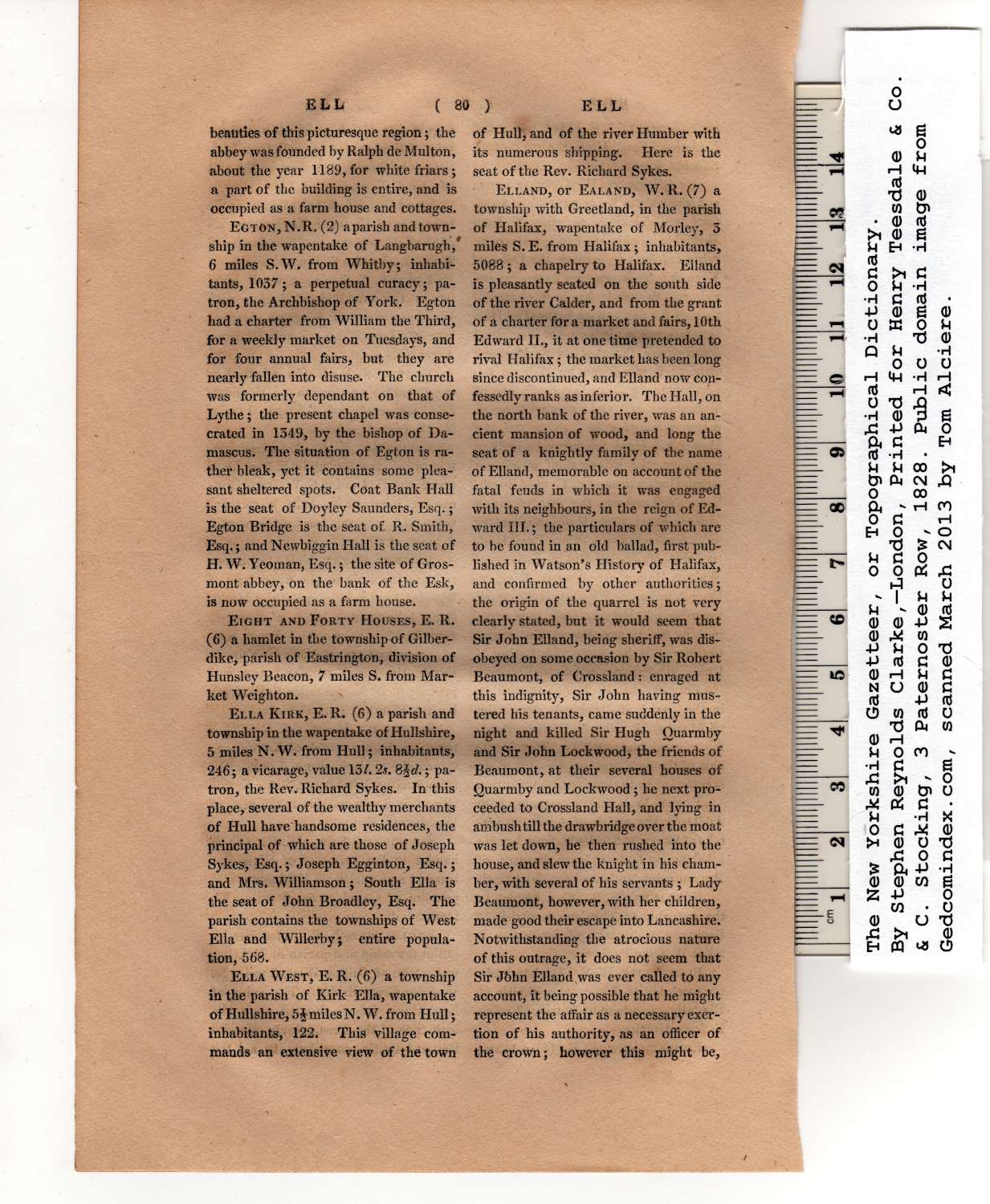|
beauties of this picturesque region; the
abbey was founded by Ralph de Multon,
about the year 1189, for white friars;
a part of the building is entire, and is
occupied as a farm house and cottages.
Egton, N.R. (2) aparish and town-
ship in the wapentake of Langbarugh,*
6 miles S.W. from Whitby; inhabi-
tants, 1037; a perpetual curacy; pa-
tron, the Archbishop of York. Egton
had a charter from William the Third,
for a weekly market on Tuesdays, and
for four annual fairs, but they are
nearly fallen into disuse. The church
was formerly dependant on that of
Lythe; the present chapel was conse-
crated in 1349, by the bishop of Da-
mascus. The situation of Egton is ra-
ther bleak, yet it contains some plea-
sant sheltered spots. Coat Bank Hall
is the seat of Doyley Saunders, Esq.;
Egton Bridge is the seat of R. Smith,
Esq.; and Newbiggin Hall is the seat of
H. W. Yeoman, Esq.; the site of Gros-
mont abbey, on the bank of the Esk,
is now occupied as a farm house.
Eight and Forty Houses, E. R.
(6) a hamlet in the township of Gilber-
dike, parish of Eastrington, division of
Hunsley Beacon, 7 miles S. from Mar-
ket Weighton.
Ella Kirk, E.R. (6) a parish and
township in the wapentake of Hullshire,
5 miles N.W. from Hull; inhabitants,
246; a vicarage, value 13/. 2s. 8§d.; pa-
tron, the Rev. Richard Sykes. In this
place, several of the wealthy merchants
of Hull have handsome residences, the
principal of which are those of Joseph
Sykes, Esq.; Joseph Egginton, Esq.;
and Mrs. Williamson; South Ella is
the seat of John Broadley, Esq. The
parish contains the townships of West
Ella and Willerby; entire popula-
tion, 568.
Ella West, E. R. (6) a township
in the parish of Kirk Ella, wapentake
of Hullshire, 5§ miles N. W. from Hull;
inhabitants, 122. This village com-
mands an extensive view of the town
of Hull, and of the river Humber with
its numerous shipping. Here is the
seat of the Rev. Richard Sykes. |
Elland, or Ealand, W. R. (7) a
township with Greetland, in the parish
of Halifax, wapentake of Morley, 3
miles S. E. from Halifax; inhabitants,
5088 ; a chapelry to Halifax. Elland
is pleasantly seated on the south side
of the river Calder, and from the grant
of a charter fora market and fairs, 10th
Edward II., it at one time pretended to
rival Halifax; the market has been long
since discontinued, and Elland now con-
fessedly ranks as inferior. The Hall, on
the north bank of the river, was an an-
cient mansion of wood, and long the
seat of a knightly family of the name
of Elland, memorable on account of the
fatal feuds in which it was engaged
with its neighbours, in the reign of Ed-
ward III.; the particulars of which are
to be found in an old ballad, first pub-
lished in Watson’s History of Halifax,
and confirmed by other authorities;
the origin of the quarrel is not very
clearly stated, but it would seem that
Sir John Elland, being sheriff, was dis-
obeyed on some occasion by Sir Robert
Beaumont, of Crossland: enraged at
this indignity, Sir John having mus-
tered his tenants, came suddenly in the
night and killed Sir Hugh Quarmby
and Sir John Lockwood, the friends of
Beaumont, at their several houses of
Quarmby and Lockwood; he next pro-
ceeded to Crossland Hall, and lying in
ambush till the drawbridge over the moat
was let down, he then rushed into the
house, and slew the knight in his cham-
ber, with several of his servants ; Lady
Beaumont, however, with her children,
made good their escape into Lancashire.
Notwithstanding the atrocious nature
of this outrage, it does not seem that
Sir J6hn Elland was ever called to any
account, it being possible that he might
represent the affair as a necessary exer-
tion of his authority, as an officer of
the crown; however this might be, |
